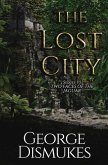The Shadows of the City of Light is a novel that both illuminates and provokes thought. Through the eyes of an old Sufi mystic, we are invited to discover a Paris that is both familiar and unseen-a city where every light casts a shadow, and every smile can conceal pain. This rare and intense work blends social satire, spiritual exploration, and captivating storytelling to delve into the fractures and hopes of our time. The story begins with the arrival of the Sufi in Paris, drawn there by a mysterious letter containing an enigmatic phrase: "The light hides in the shadows of the City of Light." From his very first steps in the city, he is confronted by its contradictions: a capital that dazzles with brilliance yet hides deep divisions beneath its surface. Paris here becomes a character in its own right-alive, vibrant, yet burdened with invisible tensions. Its cobbled streets, crowded cafés, and marginalized neighborhoods are described with an almost cinematic precision, capturing the essence of a society at a crossroads. The novel stands out for its colorful cast of characters. Three archetypal figures cross the Sufi's path, each representing a facet of humanity's challenges: Clément, a brilliant intellectual trapped in his own ego, unable to see beyond his own reflection; Madeleine, a media magnate who manipulates fear and emotions to consolidate her power; and Victor, a populist politician whose incendiary speeches exploit divisions to maintain control. These characters, while embodying destructive forces, are deeply human, and their dialogues with the Sufi resonate as confrontations between timeless wisdom and modern illusions. Yet beyond the powerful, the author also gives a voice to the invisible: the forgotten migrants under the Seine's bridges, the homeless rejected by a society in too much of a hurry, and the residents of marginalized neighborhoods fighting every day to exist. Through his calm presence and his ability to listen, the Sufi becomes a witness to their lives, a light in their darkness. Through these encounters, the novel paints an authentic portrait of the realities of racism, Islamophobia, and the fear of the other, while also offering moments of hope and humanity. What makes The Shadows of the City of Light truly unique is its literary style. The writing, both poetic and incisive, turns each scene into a sensory experience. The descriptions are remarkably precise, capturing not only the places but also the emotions etched within them. The dialogues are sharp, blending humor, spirituality, and profound reflection. Throughout the narrative, the author weaves rich metaphors and Sufi aphorisms that invite introspection. "The heaviest chains are the ones we do not see," the Sufi remarks at one point, summarizing the very essence of the book.
Hinweis: Dieser Artikel kann nur an eine deutsche Lieferadresse ausgeliefert werden.
Hinweis: Dieser Artikel kann nur an eine deutsche Lieferadresse ausgeliefert werden.








